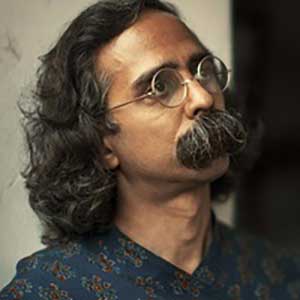Ashish Chadha, an associate professor in URI’s Harrington School of Communication and Media, has been making films for decades, but they are not the kind you might see at, say, a Showcase cinema. Chadha’s films are experimental or, as one critic puts it, “deliberately incomprehensible,” yet “visually seductive.” They explore themes of death, time, and ritual rooted in the religion, history, and philosophy of India, where he grew up.
Not surprisingly, they’ve won many international awards. Chadha’s most recent film, Aapothkalin Trikalika, or The Kali of Emergency, hit the jackpot when it was recently accepted into one of the most prestigious film festivals in the world, the 67th Berlin International Film Festival.
The film, which took seven years to make, probes our turbulent and highly divisive world—a society Chadha believes is in a perpetual state of emergency, or despair. Remarkably, he shot the movie in India without a script, used non-professional or local actors, and barely spent any money.
At URI, Chadha teaches film production and critical and historical studies of film as an art form. He encourages his students to believe in their imagination and muster the courage to make films outside corporate entertainment-based cinema. “Experimental filmmaking is a deep and rigorous creative process,” he says. “It teaches students to be critical, creative and independent—artistically, politically and intellectually.”

